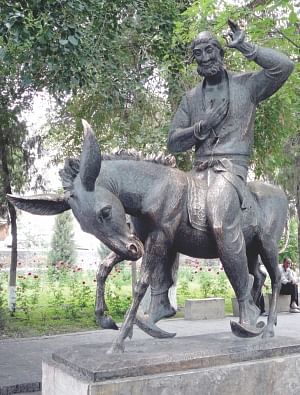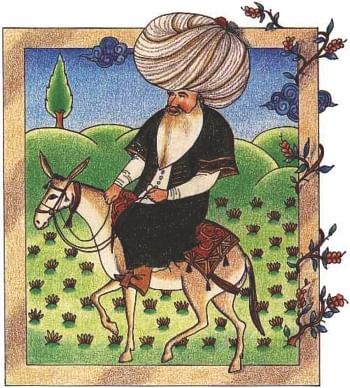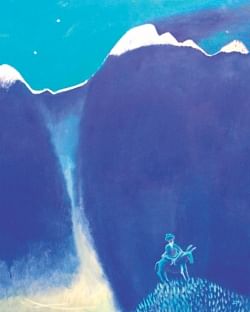| Home - Back Issues - The Team - Contact Us |
 |
| Volume 10 |Issue 40 | October 21, 2011 | |
|
|
Reflections The Wise Fool Azizul Jalil
A man wanted money from the Hodja on credit, but the Hodja said: “I have no money, but I can give you credit. How much do you want?” In Turkey in the thirteenth century, there was a little man- Nasreddin, who was very attached to his donkey. He was funny, wise and helpful to all. Called the Hodja (meaning teacher), he was born in 1204 AD and died in 1284 AD. Nasreddin was a contemporary of Jelaluddin Rumi and like him, lived and died in Konya in Turkey during the latter part of his life. He served as imam of his village and moved to another town to study as a dervish (Muslim mystic). Many Middle Eastern countries claim him, including Egypt and Iran –in the latter he is known as Mulla Nasruddin. But whatever is his origin and name, or even if he is not real but make-belief, the character is the same-sometimes foolish, sometimes wise, and often a trickster making fools of others. Witty, insightful and clever, his stories have been told, embellished and enjoyed in many languages across continents by the young and old for over seven hundred years. For the readers, I am providing a sample of his stories which I found particularly interesting and telling. The first one relates to three wise men coming from a faraway country to challenge the town to find a smart guy to answer three difficult questions. Nasreddin Hodja was considered a wise guy and he was offered to answer questions by the three visitors. First question was: Where is the centre of the world? Nasreddin instantaneously pointed with his stick the place where his donkey had its left foot. When the visitors wanted proof, Nasreddin asked them to dig down and see for themselves. The three wise men kept silent. The second wise man asked Nasreddin, “How many stars are there in the sky?” He answered: Same number as hairs on my donkey. The wise man angrily asked how could anyone count the hairs on a donkey. The Hodja replied, “And the stars in the sky? Can they be counted?” The third visitor asked, “How many hairs are there on my head?” The answer he got was: “Same number as on my donkey's tail.” To prove his point, Nasredin asked the wise man to pull one hair from his head and the donkey's tail until all had been plucked. If these are equal, Nasreddin would be right otherwise, he would be wrong. The wise men wondered how such difficult questions could be so easily answered. Nasreddin said that when there was no sensible answer to a question, then any answer would do.
One of his neighbours came to the Hodja, who was serving as a judge to complain against a fellow neighbour. He heard the charges and said, “You are quite right.” When the other neighbour came, the Hodja listened to his defence carefully and concluded,“Yes, dear neighbour, you are quite right.” The Hodja's wife, who listened to the hearings asked her husband, “Both men cannot be right.” Nasreddin anwered, “Yes, dear wife, you are quite right.” Nasreddin was old and near death. His two wives, knowing that death was near, dressed in mourning robes and veils. Nasreddin asked them to make themselves beautiful and put festive dresses. His wives said they could not do it with their dear husband on his deathbed. Nasreddin replied, “Perhaps the angel of death will see the two of you, all decked out as young brides, and will take one of you instead of me.” With these words he laughed to himself, happily closed his eyes, and died. Of the two wives of Nasreddin, one was much older than the other. She asked, “Which of us do you love the most?” Nasreddin wisely replied that he loved both the same. Not satisfied with the answer, the older wife enquired, “If the two of us fell out of a boat, which one would you rescue first?” “Well,” replied Nasreddin, “You can swim a little, can't you?” The Hodja was boosting the power of his faith. A sceptic challenged him to bring the mountain which was at a distance to come to him. The Hodja prayed hard on his knees for a long time but the mountain remained unmoved. Finally, the Hodja got up and began to walk toward the mountain. “I am a humble man”, he said, “and the faith of Islam is a practical one. If the mountain will not come to the Hodja, then the Hodja will go to the mountain.”
Nasreddin had a son who was always worried about what others thought about him. The son's attitude had to be changed. So he took him out with Nasreddin on his donkey and his son walking behind him. On the way, some men said, “Look at that selfish man who rides the donkey and makes his poor son walk.” He got down and told his son to get on the donkey. As they passed by another gathering of people, one of them remarked. “Just look at the boy, letting his poor father walk. He has no respect for grown-ups.” So Nasreddin climbed behind his son and both rode the donkey. After some time another group at the marketplace said,“Poor donkey and how unfair that he has to carry the man and the boy.” He and his son then carried the donkey between them. People then said, “How ridiculous of that madman and his son, trying to carry the donkey instead of riding it!” When the donkey was again walking on its own four legs, Nasreddin told his son, “In life it is impossible to please everyone. So do not spend time worrying about what people think.” It is a lesson for all of us to do what we think to be right and not worry about what other people might think. Nasreddin Hodja was not a fool but indeed a wise man. Perhaps that would have been a more appropriate title of this piece!
Copyright
(R) thedailystar.net 2011 |


